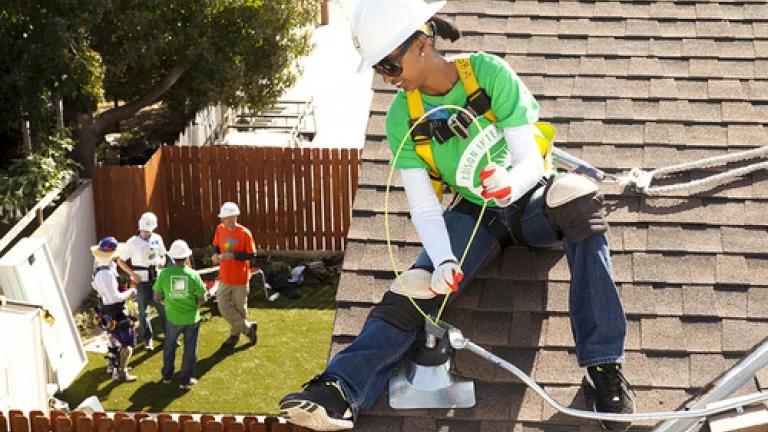GRID Alternatives and SunEdison Team Up to Train Low-Income Workers for Good Jobs in the Solar Industry

Last week, two leaders in the solar industry--GRID Alternatives, the country's largest non-profit solar installer, and SunEdison, the Missouri-based renewable energy development giant--announced a partnership that will help build clean energy jobs in low-income communities. NRDC applauds this development, for many reasons: The impacts of pollution often hit the poor hardest. And climate change will only worsen that situation. The shift to clean energy, though, offers a chance to prevent the worst impacts of climate change, while potentially creating new jobs in our communities and lessening the toll that dirty fossil fuels are currently wreaking on some of our most vulnerable.
With a donation of cash and solar panels worth $5 million, SunEdison and its foundation will enable GRID to train 4,000 low-income solar workers around the country over the next two years. "We're going to provide hands-on training, paid fellowships, job fairs, and a resume bank that will connect students at community colleges and job-training programs with employers who desperately need a pipeline of trained workers," explains GRID co-founder Erica Mackie. Indeed, solar's otherwise exponential growth in this country is significantly hampered by a dearth of trained workers, says Mackie, who meets frequently with companies frustrated in their efforts to hire. This grant, she explains, not only "highlights how training low-income workers is incredibly good for business and makes you stronger as a business by having a plurality of voices on a team. It's also a huge opportunity for our country as a whole and, in particular, for the states with policies that are driving solar growth."
A $5 million donation from SunEdison will allow GRID Alternatives, the nation's largest non-profit solar installer, to train 4,000 low-income workers for good jobs in the solar industry. (photo: GRID Alternatives)
Mackie isn't overestimating the potential here. For low-income workers, entry-level jobs as solar installers, which usually require only a high school diploma, can be an answered prayer, offering between $20-24 an hour and significant room for advancement. (Compare that to the minimum-wage jobs available to many high-school grads.) "GRID gave me the stuff you couldn't learn in the classroom," says Sal Torres, 33. The organization has installed more than 5,000 free or low-cost solar systems on the homes of low-income families across the country using an innovative barn-raising model that includes donated solar equipment, sweat equity, volunteers, state and utility incentives, and clean-energy trainees. Torres started as a GRID volunteer in 2012, went on to work as a solar installer for one of California's largest solar developers, and now works as a solar installation supervisor at GRID's Washington DC office. "In a classroom, you can do stuff on a mock roof and pretend," he explains. "But GRID gives you the real-world experience you need to get work."
And the benefits of this partnership don't stop there. For the low-income families who will be able to take advantage of the solar systems GRID and its trainees and volunteers will install, savings on electricity can total 75-90 percent. These families will have more money for necessities like food, medicine, and their kids' educations. Not only that: "The communities we work with care about soot in their air as much as anyone else," Mackie says.
For the solar industry, SunEdison included, of course, the program can help boost its already skyrocketing growth. And for the country and the world, the merits abound: with more solar workers available, we can deploy a lot more solar power. That helps mitigate global warming, spur economic development, and clean the air our kids breathe. Sounds like a grand slam to me!
Solar's growth, of course, has been sparked by federal, state and local policies that level the playing field for clean energy and help us fight global warming. And this new partnership between GRID and SunEdison spotlights the many ways that growth--with a more than a 20 percent increase in jobs year over year recently--has the potential to help repair our seriously damaged climate system while healing problems that result from poverty and unequal opportunities. "From an inclusion standpoint and an equity standpoint," Mackie says, "we're going to take these good jobs and match them with people in communities that are desperate for good jobs." In partnership with SunEdison, "we're helping create an inclusive economy and lift up communities while meeting business needs."
It's hard to think of a more promising announcement than that.

